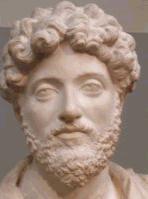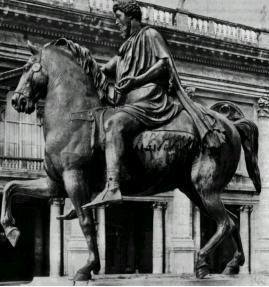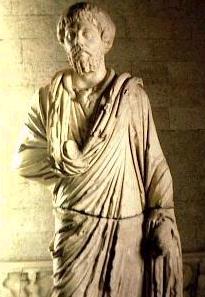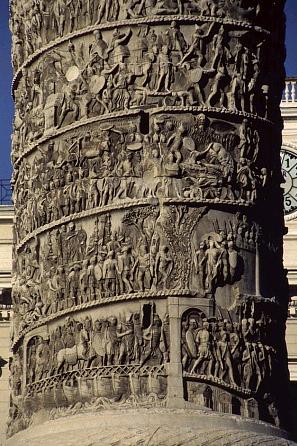
Candida Martinelli's Italophile Site

Main
Page This family-friendly site celebrates Italian culture for the enjoyment of children and
adults. Site-Overview
Marcus Aurelius, showing his famously gentle
expression. Statue of Marcus Aurelius. A statue of Marcus Aurelius . Temple of Antoninus and Faustina,
Marcus Aurelius's adoptive parents. Bust of Antoninus Pius, Marcus Aurelius's adoptive
father, and the Emperor before him. Click on the image to visit a
listing of Emperors with images of each and some basic facts about their
rule. Antonina’s
Column in Rome's 'Piazza Colonna' commemorates Marcus Aurelius's wars against the northern tribes. A close-up of the 'Colonna Antonina'. The whole 'Colonna Antonina'. A bust of Commodus, Marcus Aurelius's son, and the
head of a statue he had made of himself as a Greek God, of whom he fancied
himself to be the reincarnation. He was insane with vainglory and
self-indulgence. Click on the above logo to link to a site about the
Catacombs of Rome, to prepare for a visit, or to read about the history
of the persecution of the Early Christians under Roman rule. Click on the above logo to go to an online copy of
the 'Meditations'. It is a different translation than quoted on
this page. Click on the above text to go to yet another
translation and online copy of the 'Meditations'. Click on the above text to go to another online
copy of the same translation as the previous one.
A bust of Marcus Aurelius. Click on the text above to read about the five good
emperors, of which Marcus Aurelius was the last. Click on the logo above to visit a list of all
Roman Emperors, linking through to biographies of each. Free e-book versions are available from Project
Gutenberg, the grand-daddy of all free e-book websites.
Direct
link to the free e-books The Roman
Empire After Marcus Aurelius Limitations of Self-reflection for
Improvement Books
by or About Marcus Aurelius Marcus
Aurelius is the fifth of the so-called “five good emperors” that
preceded the decline of the Roman Empire.
He was hand picked, carefully educated, and trained for his
position. He studied at the
right hand of his predecessor, Antoninus Pius, a follower of the
Stoicists, a philosophical group that advocated moderation and
self-control. The Stoicists believed in much that the Christians
believed, but without the rejection of the multi-god beliefs.
So it is no surprise that Marcus Aurelius knew how to perform his job and carried
out his duties with diligence, which he did from 161 to 180 A.D. He was a
man who was blessed, or cursed, depending on your point of view, with a
self-reflective nature. And
like self-reflective people, he strove to become a better person.
He recorded his self-reflective journey on paper in his personal
diary, his Meditations, which were published after his death with
the title To Himself, an ironic title considering they were
written for him alone and yet published for all the world to read. While
sometimes called a treatise on the stoic life, the writings of Marcus
Aurelius are more a diary of his reflections while on campaigns to
defend fringes of the Roman Empire from invasion by enemy hordes.
Marcus Aurelius was,
unique for a reflective person,
also
a man of action when necessary, successfully defending the Empire during
his years as Emperor from 161 to 180 A.D. from revolts in the East and
enemy tribes in the North. He is also
credited with instituting other important reforms in the Empire. Laws
introduced to protect the weak from exploitation by the strong and
wealthy Laws
to protect slaves from abuse Laws
to provide for families who lost their breadwinner Foundation
of charitable institutions to help care for and educate poor
children Greater
protection for the outlying provinces against oppression Public
assistance to cities or districts struck by disasters Marcus
Aurelius and his wife, Faustina, who was also his first cousin, had
seven children all of delicate health.
Only one grew to adulthood, and he was weak not only of health
but of morality. It is
difficult to say whether the stories of Faustina’s infidelities are
true, because it is a common slander in patriarchal societies, but
Commodus was so unlike his father, that it led credence to the rumors. Marcus's
son
was wholly unsuited to be Emperor.
Alongside his ridiculously excessive vices, both sexual and in
corruption of civic life, Commodus failed to defend the Empire from
attack. He accommodated
Rome’s enemies, buying them off, thus encouraging more to try their
hand at attacking and blackmailing the vast empire. Instead of
dissuading theft-by-war with deadly resistance, he encouraged it by
making the only risk being not getting a high enough price to pay off one’s
allies. Since the gains far
outweighed the risks, the attacks continued, damaging the security of
the empire, cutting off valuable trade routes, and disrupting the time
sensitive plantings and reaping of food needed to feed the empire. Commodus,
who was killed by his own servants for the good of the empire and to
save their own lives from the fickle sadist, was followed by other
vice-filled weak leaders leading to the decline of the military, thus
leaving the Empire open to piecemeal attacks and annexations from all
sides. Other
self-reflective people have found inspiration in Marcus Aurelius’s Meditations. They should, however, also look at the book for a better
understanding of the limitations of self-reflection as a tool for
self-improvement. If the
person wishing to become a better person is closed off to external ideas
and looks only within or to those within their trusted circle, the ideas
they consider for self-criticism and self-improvement can be too limited
to make them a truly good person. This was
the case with Marcus Aurelius. He
accepted the ideas of the superstitious peoples of his time. He
condoned, and at times more than condoned, the persecution of the
minority Christians in the superstitious hope of bettering the lives of
the majority pagan citizens. Like all
superstitious peoples, the majority liked to blame all misfortune on
others, rather than just accept that misfortunes happen sometimes for no
reason whatsoever. The idea
of a chaotic and at times deadly universe was too frightening to
consider. And the idea that
these misfortunes were the result of failed leadership was something the
authorities did not want to encourage. The
majority looked to what was different around them for the reasons for
their suffering, or for the excuse.
What was very obviously different in those first centuries after
Christ’s death, was the growth of the one-God Christian faith that
disapproved of the institutionally sadistic society around them.
This radical shift from the multi-god religions and pantheism was
“blasphemy” of the most basic kind. The
majority’s pagan religion offered lots of gods to be bribed to look
after all aspects of their lives. So
when they wanted to control the chaos, they knew where to turn and what
to do. Sacrifices of money,
food, and life, not their own, were the currency of security. If the
payment didn’t work, they never wasted time wondering if they were
wrong, they just concluded they hadn’t paid a high enough price.
So they upped the amount paid, until it did work, which meant
more Christians had to die. During
this period in Rome’s history, there were many natural disasters such
as earthquakes, floods, pestilence, and starvation.
There were also enemy invasions and revolts by allies.
With each event, the payments to the gods were
increased, until
thousands of Christians were being killed in attempts to appease the
voracious gods. Marcus
Aurelius’s complicity with this mass-murder shows that self-reflection
without enlightened thought can get a person only so far.
It would take the Enlightenment and it’s descendent, Liberal
Humanism, to bring humanity to a higher moral level. While, to
me, much of the Meditations reads as a drunken or drug induced
rant by a tired and life-weary man, they have their moments of interest.
An interesting note: they
were written in Greek, the language of the educated at the time. Only much later did Latin take up that role, usurped
eventually by English, as attested to by the scientific and academic
journal preference for English. Some
points, key to the Stoic Philosophy, are repeated throughout the twelve
Books that make up the Meditations. Reason
must rule the body; logic must be used to determine the truth, by
first collecting differing ideas and then testing them against the
facts to see which hold firm, and re-evaluating them as new facts
become available. Live
according to nature, which means accepting that we are all a part of
God’s universe with a bit of God in all of us, called our soul,
and we must try to behave as God-like as possible to honor our soul
and God, and the most God-like behavior is to work for the common
good. It is
in your own power to maintain the beauty of your soul, or to be a
decent human being; the ethics of our lives, how we put to use the
truths we determine, define who we are and we are in control of our
choices and behavior; the highest good is a virtuous life and that
can be achieved by living in moderation. Death
can come at any moment so be prepared for it; this is a common
sentiment in those faraway times (and sadly for many still today)
with poor healthcare, irregular diets, poor storage and preservation
of food, and frequent violence; Marcus Aurelius certainly thought of
it more than others because he suffered poor health all his life,
dying at the age of 59 from a long and painful illness. Use
self-reflection to purify your soul and find truth and right; review
each day your actions and reactions to others and ask yourself if
you behaved as you should, then resolve to improve your behavior the
next day; also keep good thoughts, as thoughts predetermine our
actions. Fame
is fleeting so one should not seek it, and if one has it, don’t
court it or indulge in it, or place too high a value on it, because
it has so little real value in the big scheme of things; as Emperor,
one can imagine his position gained him many wannabe sycophants, and
it seems clear that Marcus Aurelius shunned them; he is famous for
appointing worthy advisers and military and civic leaders. My list of books by or about Marcus Aurelius available at
Amazon.com
To broaden your search to the era or contemporaries,
you can use this Search tool for Amazon.com.
Just
enter 'Books' in the 'Search' field, and names or words in the
'Keyword' field (for example 'Antoninus Pius' or 'Commodus'). Then click on the 'Go' button to see what's
available, what people's comments about the books are, and what they
cost.
Here
are some passages from the Meditations by Marcus Aurelius, that I
found interesting, that I thought you might enjoy. Book
One, VIII: …how
much envy and fraud and hypocrisy the state of a tyrannous king is
subject unto, and how they who are commonly called nobly born, are in
some sort incapable, or void of natural affection. Book
Two, II: Let
it be thy earnest and incessant care as a Roman and a man to perform
whatsoever it is that thou art about, with true and unfeigned gravity,
natural affection, freedom and justice… Which thou shalt do; if thou
shalt go about every action as thy last action, free from all vanity,
all passionate and wilful aberration from reason, and from all
hypocrisy, and self-love…those things, which for a man to hold on in a
prosperous course, and to live a divine life, are requisite and
necessary, are not many… Book
Two, IV: …Give thyself
leisure to learn some good thing, and cease roving and wandering to and
fro… Book
Two, V: …whosoever they
be that intend not, and guide not by reason and discretion the motions
of their own souls, they must of necessity be unhappy. Book
Two, VII: …those sins are
greater which are committed through lust, than those which are committed
through anger. For he that is angry seems with a kind of grief and close
contraction of himself, to turn away from reason; but he that sins
through lust, being overcome by pleasure, doth in his very sin betray a
more impotent, and unmanlike disposition… Book
Two, VIII: Whatsoever thou
dost affect, whatsoever thou dost project, so do, and so project all, as
one who, for aught thou knowest, may at this very present depart out of
this life…and as for those things which be truly evil, as vice and.
wickedness, such things they have put in a man’s own power, that he
might avoid them if he would… Book
Two, XI: …There is
nothing more wretched than that soul, which in a kind of circuit
compasseth all things, searching (as he saith) even the very depths of
the earth; and by all signs and conjectures prying into the very
thoughts of other men's souls; and yet of this, is not sensible, that it
is sufficient for a man to apply himself wholly, and to confine all his
thoughts and cares to the tendance of that spirit which is within him,
and truly and really to serve him. His service doth consist in this,
that a man keep himself pure from all violent passion and evil
affection, from all rashness and vanity, and from all manner of
discontent… Book
Two, XV: The time of a
man's life is as a point; the substance of it ever flowing, the sense
obscure; and the whole composition of the body tending to corruption.
His soul is restless, fortune uncertain, and fame doubtful; to be brief,
as a stream so are all things belonging to the body; as a dream, or as a
smoke, so are all that belong unto the soul.
Our life is a warfare, and a mere pilgrimage. Fame after life is
no better than oblivion. What
is it then that will adhere and follow?
Only one thing, philosophy. And philosophy doth consist in this,
for a man to preserve that spirit which is within him, from all manner
of contumelies and injuries, and above all pains or pleasures; never to
do anything either rashly, or feignedly, or hypocritically: wholly to
depend from himself and his own proper actions: all things that happen
unto him to embrace contentedly, as coming from Him from whom he himself
also came; and above all things, with all meekness and a calm
cheerfulness, to expect death, as being nothing else but the resolution
of those elements, of which every creature is composed… Book
Three, IV: …think only of
such things, of which if a man upon a sudden should ask thee, what it is
that thou art now thinking, thou mayest answer This, and That, freely
and boldly, that so by thy thoughts it may presently appear that in all
thee is sincere, and peaceable; as becometh one that is made for
society, and regards not pleasures, nor gives way to any voluptuous
imaginations at all: free from all contentiousness, envy, and suspicion,
and from whatsoever else thou wouldest blush to confess thy thoughts
were set upon… Book
Three, VIII: Never esteem
of anything as profitable, which shall ever constrain thee either to
break thy faith, or to lose thy modesty; to hate any man, to suspect, to
curse, to dissemble, to lust after anything, that requireth the secret
of walls or veils… Book
Three, X: …The time
therefore that any man doth live, is but a little, and the place where
he liveth, is but a very little corner of the earth, and the greatest
fame that can remain of a man after his death, even that is but little,
and that too, such as it is whilst it is, is by the succession of silly
mortal men preserved, who likewise shall shortly die, and even whiles
they live know not what in very deed they themselves are: and much less
can know one, who long before is dead and gone. Book
Four, III: …A man cannot
any whither retire better than to his own soul; he especially who is
beforehand provided of such things within, which whensoever he doth
withdraw himself to look in, may presently afford unto him perfect ease
and tranquillity. By
tranquillity I understand a decent orderly disposition and carriage,
free from all confusion and tumultuousness.
Afford then thyself this retiring continually, and thereby
refresh and renew thyself… Book
Four, X: …if any man that
is present shall be able to rectify thee or to turn thee from some
erroneous persuasion, that thou be always ready to change thy mind, and
this change to proceed, not from any respect of any pleasure or credit
thereon depending, but always from some probable apparent ground of
justice, or of some public good thereby to be furthered; or from some
other such inducement. Book
Four, XX: …For since it
is so, that most of those things, which we either speak or do, are
unnecessary; if a man shall cut them off, it must needs follow that he
shall thereby gain much leisure, and save much trouble, and therefore at
every action a man must privately by way of admonition suggest unto
himself, What? may not this that now I go about, be of the number of
unnecessary actions?… Book
Four, XXI: …To comprehend
all in a few words, our life is short; we must endeavour to gain the
present time with best discretion and justice.
Use recreation with sobriety. Book
Four, XXIV: He is a true
fugitive, that flies from reason, by which men are sociable.
He blind, who cannot see with the eyes of his understanding.
He poor, that stands in need of another, and hath not in himself
all things needful for this life… Book
Four, XXVII: …thy
carriage in every business must be according to the worth and due
proportion of it, for so shalt thou not easily be tired out and vexed,
if thou shalt not dwell upon small matters longer than is fitting. Book
Four, XXVIII: …And this I
say of them, who once shined as the wonders of their ages, for as for
the rest, no sooner are they expired, than with them all their fame and
memory. And what is it then
that shall always be remembered? all is vanity.
What is it that we must bestow our care and diligence upon? even
upon this only: that our minds and wills be just; that our actions be
charitable; that our speech be never deceitful, or that our
understanding be not subject to error… Book
Four, XL: Thou must be like
a promontory of the sea, against which though the waves beat
continually, yet it both itself stands, and about it are those swelling
waves stilled and quieted. Book
Five, III: …If it be
right and honest to be spoken or done, undervalue not thyself so much,
as to be discouraged from it… Book
Six, XIV: Some things
hasten to be, and others to he no more.
And even whatsoever now is, some part thereof bath already
perished. Perpetual fluxes
and alterations renew the world, as the perpetual course of time doth
make the age of the world (of itself infinite) to appear always fresh
and new… Book
Six, XX: If anybody shall
reprove me, and shall make it apparent unto me, that in any either
opinion or action of mine I do err, I will most gladly retract.
For it is the truth that I seek after, by which I am sure that
never any man was hurt; and as sure, that he is hurt that continueth in
any error, or ignorance whatsoever. Book
Six, XXVI: Death is a
cessation from the impression of the senses, the tyranny of the
passions, the errors of the mind, and the servitude of the body. Book
Six, XXVII: If in this kind
of life thy body be able to hold out, it is a shame that thy soul should
faint first, and give over, take heed, lest of a philosopher thou become
a mere Caesar in time, and receive a new tincture from the court.
For it may happen if thou dost not take heed. Keep thyself therefore, truly simple, good, sincere, grave,
free from all ostentation, a lover of that which is just, religious,
kind, tender-hearted, strong and vigorous to undergo anything that
becomes thee… Book
Six, XXVIII: (Editor: an
ode to his predecessor and adoptive father.)
Do all things as becometh the disciple of Antoninus Pius.
Remember his resolute constancy in things that were done by him
according to reason, his equability in all things, his sanctity; the
cheerfulness of his countenance, his sweetness, and how free he was from
all vainglory; how careful to come to the true and exact knowledge of
matters in hand, and how he would by no means give over till he did
fully, and plainly understand the whole state of the business; and how
patiently, and without any contestation he would bear with them, that
did unjustly condemn him: how he would never be over-hasty in anything,
nor give ear to slanders and false accusations, but examine and observe
with best diligence the several actions and dispositions of men.
Again, how he was no backbiter, nor easily frightened, nor
suspicious, and in his language free from all affectation and curiosity:
and how easily he would content himself with few things, as lodging,
bedding, clothing, and ordinary nourishment, and attendance.
How able to endure labour, how patient; able through his spare
diet to continue from morning to evening without any necessity of
withdrawing before his accustomed hours to the necessities of nature:
his uniformity and constancy in matter of friendship.
How he would bear with them that with all boldness and liberty
opposed his opinions; and even rejoice if any man could better advise
him: and lastly, how religious he was without superstition.
All these things of him remember, that whensoever thy last hour
shall come upon thee, it may find thee, as it did him, ready for it in
the possession of a good conscience. Book
Six, XLVIII: Use thyself
when any man speaks unto thee, so to hearken unto him, as that in the
interim thou give not way to any other thoughts; that so thou mayst (as
far as is possible) seem fixed and fastened to his very soul, whosoever
he be that speaks unto thee. Book
Six, XLIX: That which is
not good for the bee-hive, cannot be good for the bee. Book
Seven, XV: Is any man so
foolish as to fear change, to which all things that once were not owe
their being?… Book
Seven, XXXIII: The art of
true living in this world is more like a wrestler's, than a dancer's
practice. For in this they
both agree, to teach a man whatsoever falls upon him, that he may be
ready for it, and that nothing may cast him down. Book
Seven, XXXVIII: For it is a
thing very possible, that a man should be a very divine man, and yet be
altogether unknown. This
thou must ever be mindful of, as of this also, that a man's true
happiness doth consist in very few things… Book
Seven, XL: Then hath a man
attained to the estate of perfection in his life and conversation, when
he so spends every day, as if it were his last day:
never hot and vehement in his affections, nor yet so cold and
stupid as one that had no sense; and free from all manner of
dissimulation. Book
Eight, II: Upon every
action that thou art about, put this question to thyself; How will this
when it is done agree with me? Shall I have no occasion to repent of
it?… Book
Eight, VIII: Forbear
henceforth to complain of the trouble of a courtly life, either in
public before others, or in private by thyself. Book
Eight, XIII: At thy first
encounter with any one, say presently to thyself: This man, what are his
opinions concerning that which is good or evil? as concerning pain,
pleasure, and the causes of both; concerning honour, and dishonour,
concerning life and death? thus and thus.
Now if it be no wonder that a man should have such and such
opinions, how can it be a wonder that he should do such and such
things?… Book
Eight, XIV: Remember, that
to change thy mind upon occasion, and to follow him that is able to
rectify thee, is equally ingenuous, as to find out at the first, what is
right and just, without help. For
of thee nothing is required, that is beyond the extent of thine own
deliberation and judgment, and of thine own understanding. Book
Eight, XXVIII: Whether thou
speak in the Senate or whether thou speak to any particular, let thy
speech In always grave and modest…. Book
Eight, XLIX: Not to be
slack and negligent; or loose, and wanton in thy actions; nor
contentious, and troublesome in thy conversation; nor to rove and wander
in thy fancies and imaginations. Not
basely to contract thy soul; nor boisterously to sally out with it, or
furiously to launch out as it were, nor ever to want employment. Book
Eight, LI: He that knoweth
not what the world is, knoweth not where he himself is. Book
Eight, LVI: All men are
made one for another: either then teach them better, or bear with them. Book
Eight, LVII: The motion of
the mind is not as the motion of a dart.
For the mind when it is wary and cautelous, and by way of
diligent circumspection turneth herself many ways, may then as well be
said to go straight on to the object, as when it useth no such
circumspection. Book
Nine, I: He that is unjust,
is also impious. For the
nature of the universe, having made all reasonable creatures one for
another, to the end that they should do one another good; more or less
according to the several persons and occasions but in nowise hurt one
another: it is manifest
that he that doth transgress against this her will, is guilty of impiety
towards the most ancient and venerable of all the deities… Book
Nine, II: It were indeed
more happy and comfortable, for a man to depart out of this world,
having lived all his life long clear from all falsehood, dissimulation,
voluptuousness, and pride. But
if this cannot be, yet it is some comfort for a man joyfully to depart
as weary, and out of love with those; rather than to desire to live, and
to continue long in those wicked courses… Book
Nine, IX: Either teach them
better if it be in thy power; or if it be not, remember that for this
use, to bear with them patiently, was mildness and goodness granted unto
thee… Book
Nine, XIV: As virtue and
wickedness consist not in passion, but in action; so neither doth the
true good or evil of a reasonable charitable man consist in passion, but
in operation and action. Book
Nine, XVI: Sift their minds
and understandings, and behold what men they be, whom thou dost stand in
fear of what they shall judge of thee, what they themselves judge of
themselves. Book
Nine, XVIII: It is not
thine, but another man's sin. Why
should it trouble thee? Let
him look to it, whose sin it is. Book
Nine, XXV: When any shall
either impeach thee with false accusations, or hatefully reproach thee,
or shall use any such carriage towards thee, get thee presently to their
minds and understandings, and look in them, and behold what manner of
men they be… Book
Nine, XXVI: Up and down,
from one age to another, go the ordinary things of the world; being
still the same… Book
Nine, XXVIII: And these
your professed politicians, the only true practical philosophers of the
world, (as they think of themselves) so full of affected gravity, or
such professed lovers of virtue and honesty, what wretches be they in
very deed; how vile and contemptible in themselves?… Book
Nine, XXXV: Will this
querulousness, this murmuring, this complaining and dissembling never be
at an end?… Book
Nine, XLIII: When at any
time thou art offended with any one's impudency, put presently this
question to thyself: 'What?
Is it then possible, that there should not be any impudent men in
the world! Certainly it is not possible.'… Book
Ten, IX: Toys and fooleries
at home, wars abroad: sometimes
terror, sometimes torpor, or stupid sloth: this is thy daily slavery… Book
Ten, XVII: So live as
indifferent to the world and all worldly objects, as one who liveth by
himself alone upon some desert hill… Book
Eleven, III: That soul
which is ever ready, even now presently (if need be) from the body,
whether by way of extinction, or dispersion, or continuation in another
place and estate to be separated, how blessed and happy is it!… Book
Eleven, XIV: How rotten and
insincere is he, that saith, I am resolved to carry myself hereafter
towards you with all ingenuity and simplicity.
O man, what doest thou mean! what needs this profession of thine? The thing itself will show it.
It ought to be written upon thy forehead. No sooner thy voice is heard, than thy countenance must be
able to show what is in thy mind: even
as he that is loved knows presently by the looks of his sweetheart what
is in her mind… Book
Eleven, XXI: Socrates was
wont to call the common conceits and opinions of men, the common
bugbears of the world: the
proper terror of silly children. Book
Twelve, II: God beholds our
minds and understandings, bare and naked from these material vessels,
and outsides, and all earthly dross… Book
Twelve, III: I have often
wondered how it should come to pass, that every man loving himself best,
should more regard other men's opinions concerning himself than his
own… Book
Twelve, X: How ridiculous
and strange is he, that wonders at anything that happens in this life in
the ordinary course of nature! Book
Twelve, XIII: If it be not
fitting, do it not. If it
be not true, speak it not. Ever
maintain thine own purpose and resolution free from all compulsion and
necessity. Book
Twelve, XXV: What a small
portion of vast and infinite eternity it is, that is allowed unto every
one of us, and how soon it vanisheth into the general age of the world: of the common substance, and of the common soul also what a
small portion is allotted unto us:
and in what a little clod of the whole earth (as it were) it is
that thou doest crawl. After
thou shalt rightly have considered these things with thyself; fancy not
anything else in the world any more to be of any weight and moment but
this, to do that only which thine own nature doth require; and to
conform thyself to that which the common nature doth afford. References: Various including those referenced on this page, and Marcus
Aurelius’s Meditations, Penguin Popular Classics edition, and
the Project Gutenberg free text file with the same translation.
Also see my pages:

The
Diary of Roman Emperor Marcus Aurelius - Meditations to Himself--Excerpts
and links
to full text
![]()










The Roman
Empire After Marcus Aurelius
The
Limitations of Self-reflection for Self-improvement
The Meditations
Books
by or About Marcus Aurelius

Excerpts
from the Meditations